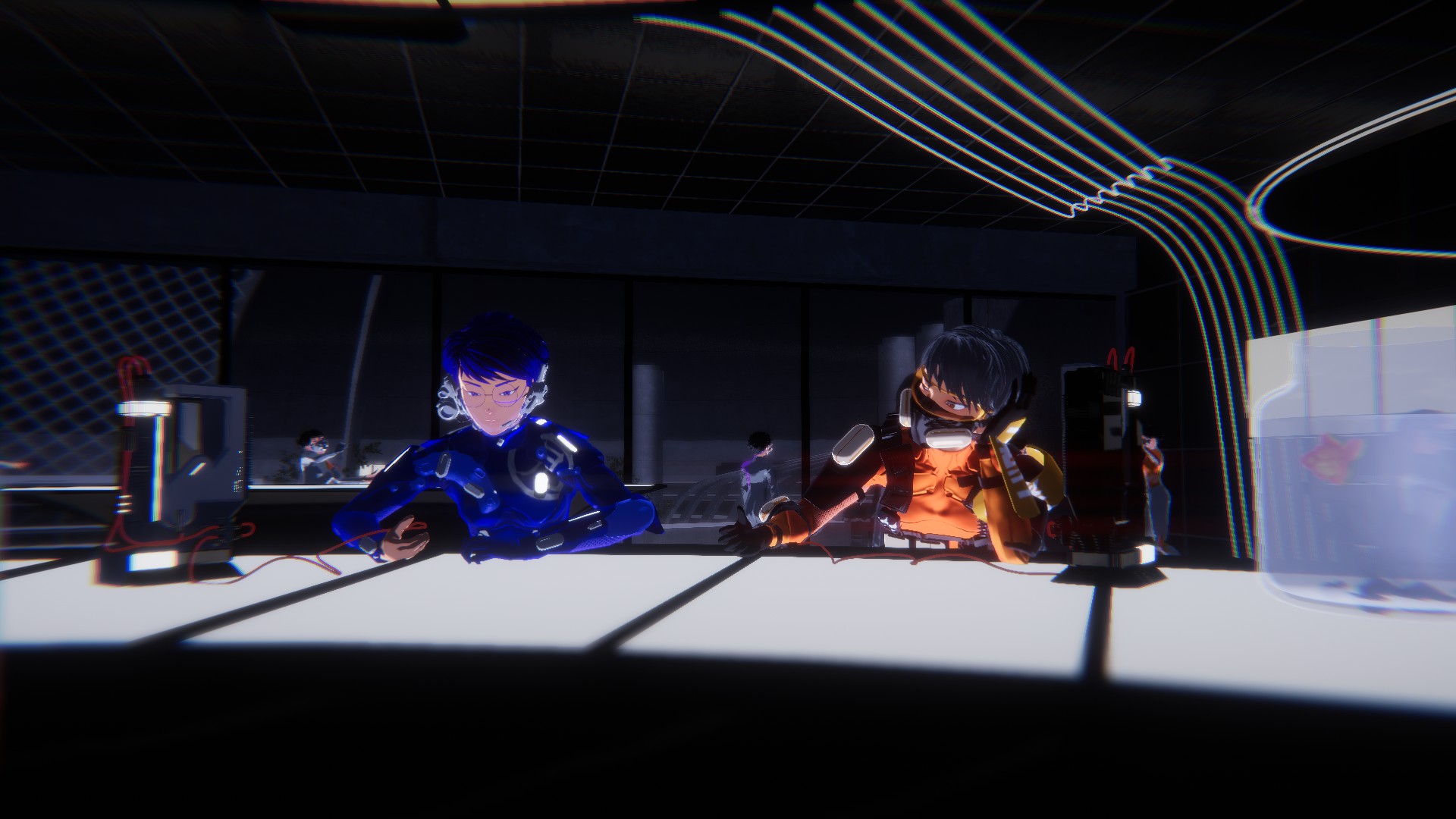

In addition to our main Game of the Year Awards 2024, each member of the PC Gamer team is shining a spotlight on a game they loved this year. We'll post new personal picks, alongside our main awards, throughout the rest of the month.
The Allmother is dead. Stabbed through the heart for a multitude of cruelties by one of her own cloned 'sisters,' there's no going back. Many stories would end here, in this seeming moment of triumph. But for 1000xResist, it's just the opening image. Long live the Allmother!
In Sunset Visitor's debut game, the Allmother reigns at a distance over a society of her own clones. They dwell under an inside sky, safe from the alien Occupants on the surface but not from an airborne, moisture-purging virus. One crack in a sister's mask and it's all over. The Allmother, on the other hand, is the only one immune to this devastating disease.
It has not always been this way. Once upon a time, the Allmother was just a girl called Iris, the teenaged daughter of parents who left Hong Kong in the wake of the protests throughout 2019 and 2020. Once upon a time, the Allmother was definitely only human.
A pseudo-time-travelling mechanic arguably inspired by Millennium Actress (which just so happens to be one of my favourite films) is core to much of 1000xResist. As Watcher, a clone with a revered function, you are tasked with the responsibility of 'communion'—excavating the Allmother's memories as an immersive simulation. What follows is an exploration focused narrative game, and one of the best sci-fi stories I've experienced in years.
As you hop through Iris' school days either side of a deadly pandemic, there's a simple pleasure to exploration through the lens of Watcher's temporally distant perspective. For instance, typical first names like 'Iris' are seen as 'opaque keywords' by the function-focused society of the clones. For another, when Watcher asks how a school locker works, her travelling companion Secretary explains it hinges on "A password made of numbers and directional choreography." Watcher observes, "There must have been rampant theft." Secretary replies, "Either that, or rampant mistrust." With a smugness recognisable by anyone who has felt superior to denizens of the past, Watcher says, "I feel sorry for them."

The best speculative fiction, while often laying its scene in the future, still distinctly comments on our present; many recognisable fears and anxieties reside in these halls. Case in point, you can spy the student council fighting over what they will be remembered for. The flashpoint of their argument is a fox statue—the incomplete passion project of a school councillor before them, the context of which has long since been lost to history. The council president makes the case that they should make room in the budget to complete the statue, partly because it meant something to someone, while his opposing speaker argues the most expedient resolution would be to do away with the statue completely. No agreement is reached as both sides run out of time, and the council is told to immediately report to the gym. The treasurer bemoans, "Our great grandchildren will be paying our debts."
Skipping ahead a short span of years, you encounter another character petting the long since abandoned statue. They ask what kind of animal it is—they've only seen foxes in picturebooks from the old world.
'What we leave behind' is a theme that goes hand in hand with many of the characters' desire to understand the inner life of a distant, often parental figure. To say Iris' relationship with her own mother is complicated is to obscure through euphemism, and sharp character writing allows 1000xResist to explore this in a believably messy way. For just one devastating example, in a private conversation exposed by worship, Iris calls her own mother a coward for leaving Hong Kong. This strained parent-child relationship echoes throughout everything that follows as Iris leaves the role of 'daughter' behind in favour of becoming 'Allmother.'
After finishing 1000xResist for the first time, my first thought was, 'I really want to tell my mum about this game.' Though not a huge gamer, she is curious about games; together, we've been picking away at Pentiment, and it turns out we both had strong opinions about Yakuza 0's treatment of its female cast. Like any art, games are another vector for understanding, and I'm still really looking forward to that conversation.
Upon playing 1000xResist a second time, I'm also left wishing I could call my dad. We both love scifi, so much so that when I wrote his eulogy, I kind of felt it had to conclude with the Tears in Rain speech from Blade Runner. When my dad died, he left behind no handwritten letters, no journals save for a few hastily scribbled notes in pencil. We recently got into his email, discovering the server only holds onto messages through one year of account inactivity—after that, it simply deletes them. In between scrolling through our shared archive of sporadic WhatsApp messages, I find myself thinking about Silent Hill 3; after Harry Mason is killed by the cult, his adoptive daughter Heather travels to the titular town and discovers his notes scattered throughout, coming to understand not only some of the hell he went through, but also his paternal love in spite of it all.

I know I'm hardly the first to mention Silent Hill and 1000xResist in the same breath; there's no Mumblers to fight here, but those fixed camera angles still create school halls suffering from no lack of foreboding. An incredibly stylish game, Sunset Visitor leverages their collective theatrical experience to create stunning tableaus that elevate the game's occasionally unrefined visual assets, and you're treated to one of these standouts as Watcher finally enters the school gym. This memory is the site of the pandemic's first mass spreader event, and is in many ways the beginning of Iris' transformation into the Allmother. The overseer of the clones' inside sky, Principal, is seen dancing on stage, surrounded by the floating forms of those first to die.
Sometimes sci-fi has a surprising amount to say about faith. Principal tells Watcher that excavating these memories through communion is part of that most sacred of duties: "to trust Her." Indeed, Principal always says the appropriately reverent thing, but you soon discover just how far she'll reach for evidence of the Allmother's love. It never seems to be enough, and she is weighted down by the pursuit. She says to Watcher she's revisited this moment in the school gym many times—and yet still warns, "Nostalgia can be a dangerous thing."
The true extent of Principal's reinventorying of the past is just one thread you really should unpick for yourself. Watcher's imperfect understanding of the Allmother, and how that fuels 1000xResist's inciting incident is another—to say nothing of the betrayal that caps off just the first chapter. Even after two playthroughs, I'm still peeling back all of the layers of Sunset Visitor's debut game, and I'm sure this will be far from my final communion. Hekki grace.







